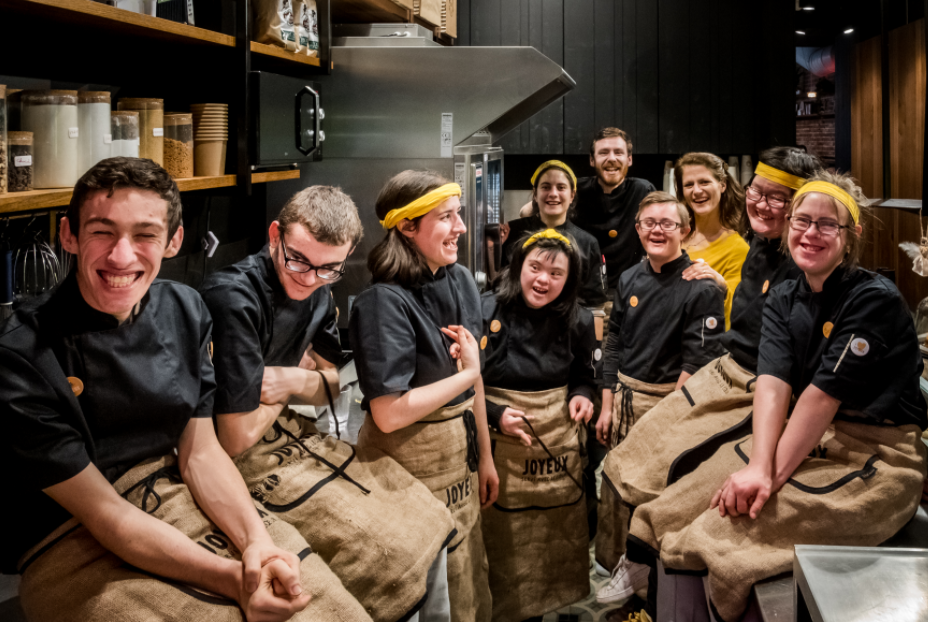By Evi Tsakali,
It all started with ads that I saw at metro stations; images of people smiling, looking very happy, holding a cup a coffee, accompanied with the message “Café Joyeux, servi avec le cœur” (“Happy Café [a translation of the coffee shop’s name], served with the heart”). The logo was a cute yellow face, and I could not help but notice and admire the representation of handicapped people in those posters. However, after a bit of research, I realized that this representation was not only about advertising but also about employment; Café Joyeux, as I found out, is a café that specifically employs people with disabilities. Since then, I have always tried to support them, choosing this coffee shop when I am in the district of Paris, where there is one, and it has been a while that I had decided to dedicate an article to this beautiful initiative.
The project behind Café Joyeux
In 2017, the first solidarity restaurant Café Joyeux was born, which employs and trains people mainly with Down’s Syndrome or cognitive disorders, such as autism.
Their ambition, according to their mission statement, is to “make disability visible and promote encounters, by offering work, in an ordinary environment, to people excluded from employment. Café Joyeux is meant to be an ordinary business”. Their “happy house”, as they call it, intends to build a profitable model, and turn differences into strength. After an initial assessment, the “happy team members” (“équipiers joyeux”) are all recruited and trained by a team of HR, management, cooking, and specialist educators. At the end of their training, the team members join the Cafés Joyeux on CDI (the French permanent contract). Depending on their abilities, and always supervised by benevolent managers, they occupy various catering professions: reception, cash desk, cooking, service. Café Joyeux allows all its employees to grow in confidence and experience, while being completely engaged in the business.
Its importance in the French context
In France, 700,000 people are diagnosed with autism spectrum disorders, and 65,000 have Trisomy 21. Unemployment affects them two to three times as much as the rest of the population. Only 0.5% of people with intellectual disabilities work in an ordinary environment. Working at Café Joyeux has changed the lives of both the employees themselves and their loved ones, and the testimonials speak for themselves;

“I am really happy to work for you, it is my nicest gift; I want to exist in this professional world.” — Charlotte, staff member
“I am very happy to work here, it makes me smile, it gives me the joy of being in contact with people.” — Emmanuel, staff member
“This job has brought me so much happiness, because I have made a lot of friends since my arrival here. I told myself that I am like all the others and that, even though I am handicapped, I can work, I can have an apartment of my own, I can have everything.” — Brandon, staff member
“We were very relieved when Nicolas was employed at Café Joyeux. We are very proud. When he gets up in the morning, he is happy to go to work […] he is proud of being useful, he has built his self-esteem.” — The parents of Nicolas, a staff member
Where to find them
Today, you can find Café Joyeux in Paris (Champs-Elysées, Opéra, Olympia), Rennes, and Bordeaux. Recently, under the auspices of a Portuguese NGO, the first branch outside of France was inaugurated in Lisbon. The team aspires to expand even more and, if the right collaborations are achieved, we will see many more branches open in the foreseeable future. I hope that one day, if an NGO or an organism is interested in adopting this initiative, we will see a branch of Café Joyeux in Greece as well.
References
- Café Joyeux’s official website, cafejoyeux.com, Available here




